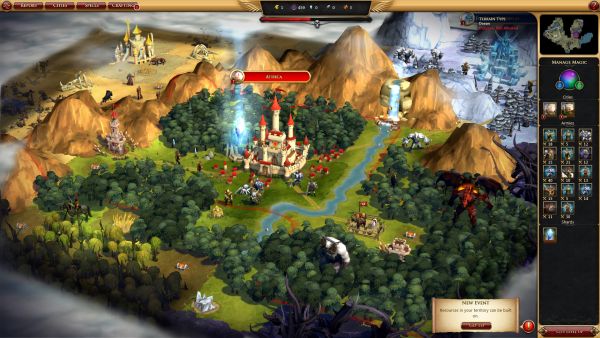It begins when you lose…
There’s a lot of games that follow a similar path, one well-trodden by many a classic fantasy novel. Struggling loner saves desperate kingdom from impending doom at the hands of a mighty dark lord. Sorcerer King starts as most of these tales, and changes the basic premise to something a little bit darker.
Basically, the free world lost, the Sorcerer King won, and now the nations strive to throw off his evil rule. And, to make matters worse… the mad bastard isn’t content with merely ‘ruling the world’. He’s planning on casting a mighty spell that has the upside of turning him into a God, but with the annoying downside of, well, destroying the world.
This simple inversion of the classic fantasy trope flavours of every aspect Sorcerer King, turning a good if non-descript 4X fantasy adventure into something a lot more interesting. From the very beginning, the sense of impending doom is pretty strong, and how you approach this apocalyptic scenario shapes how the game unfolds.
At the start of the game you choose the leader of your struggling nation. You might be a defeated warlord, or a tyrant with delusions of grandeur, but each of the six possible leaders have something in common. For one, they are all pretty well defined – you can tweak things like starting champions and spell research, but to allowfor a more structured tale than previous Stardock titles, the actual narratives of each possible character are set. This means the game lacks the ability to really shape your in-game avatar, but in turn you get a story structured around you and your strained relationship with the Sorcerer King himself.
This is most evident in the conversations between you and Mr. S. King. He might notice your expanding armies, and ask what’s going on, leading to a simple conversation tree that may or may not lead to certain, ahem, consequences. As you recruit champions and other units, some may in fact be the King’s spies; and, since the clock is literally ticking on your existence, you really can’t afford to turtle up in your one starting city and wait things out.
One of the neatest aspects of the game is the Doomsday Clock, a progress bar that ominously fills up as the Sorcerer King gets closer to his goal. Not only is this regularly advanced by the passage of turns in game, but some of your decisions can also speed it up. If you act too pushy, it gets faster, for instance, but some spells can also push the world closer to destruction, so you’re constantly managing risk versus reward. One character class, the Tyrant, actually gets stronger as the Clock ticks away, making for a particularly risky game.
You’re also not alone in the world. There are up to six other factions, which can be chosen or randomly picked, also trying to survive. Some may be enemies, others neutral, or you can try to get them to ally with you against the Big Bad. Progression through each randomly generated map and campaign is like walking a tightrope made up of bad decisions and well-considered fantasy tropes.
Thankfully, the game’s writing is grim, but funny. As you discover quests for your champions and armies to complete, you might be called upon to forcibly recruit or trick possible troops, or even walk away from some troubles completely.
Nearly every element of gameplay is pretty simple, and the UI takes a very active hand in making sure you don’t forget anything. If the last chest you looted has something that makes up a crafting recipe, a notification pops up. If you’ve left a unit idle, likewise. You move your units – and the game has a pretty small unit count, which is actually pretty relaxing – around the map, building outposts to expand your empire, exploring, taking on bandits and minor monsters, and then dealing with your competitor states. Along the way you need to build shrines on the mysterious Shards, which are the source of all magic in the land.
You can either let the AI handle battles automatically, which is surprisingly effective, or fight things out on a simple square grid. Here, the combat actions execute based on unit initiative, and should be intimately familiar to any Might and Magic fan. However, not only does each of your units have their moves and attacks (special or otherwise), but your sovereign can also influence the course of a battle. Sovereign spells are very powerful early on (the game does a good job of making you feel like you’re not just starting out), but do a get a little flat in the end-game. We’re particularly fond of the Tyrants Hypnotise spell, which can turn enemies into allies.
There’s a distinctly boardgame feel to Sorcerer King, thanks to its low unit count and simple map mechanics, and while it’s certainly fun, the tendency for the end-game to get rather samey does reduce the game’s replayability. That said, it really isn’t a game you want to play a lot of – it doesn’t have the same deeply addicting pull of other, similar titles. This isn’t necessarily a bad thing, either, as it’s a great game to play when you’re feeling like something a little bit different. Its combination of simple but clever mechanics, focused storytelling, and a really unique premise, make for a charming 4X title. DAVID HOLLINGWORTH
An interesting take on a classic genre, with some great writing and variably rich worlds to explore.


